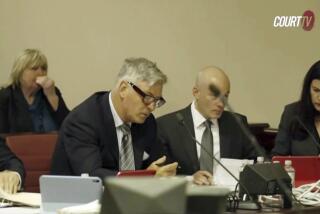Issues in Trial May Go Far Beyond Simpson’s Fate : Ongoing problems bring forth new calls for reform of jury system
- Share via
The morbidly curious continue to come. Ten months after the murder of Nicole Brown Simpson and Ronald Lyle Goldman, a steady procession of lookers still passes the Brentwood condominium, the scene of the crime, and by Simpson’s grave in an Orange County cemetery. But the same facets of this case that draw people to these sites from around the world--the fame of defendant O.J. Simpson and the viciousness of the double murder of which he stands accused--also may threaten the integrity of his trial.
Courtroom testimony now focuses on the rigor of the police and coroner’s investigation at the crime scene immediately after the murder last June and on the scientific validity of DNA evidence. But the attention of the public--and perhaps of the jurors--may range to other matters, including the dynamics within the panel itself. Last week’s dismissal of juror Jeanette Harris has amplified questions about criminal trial procedure and the pressures of jury service that have dogged this trial and other notorious criminal trials.
Harris, 38, a job counselor, was excused by Judge Lance A. Ito for allegedly failing to disclose her involvement in an incident of domestic abuse during pretrial questioning, an allegation she denies. Harris is the sixth juror excused in 12 weeks of trial, and many observers believe that the proceeding is not even half over. Her departure leaves just six alternate jurors remaining and growing concern about the possibility of a mistrial. The jury, already sequestered for three months, is experiencing the understandable stress of confinement and isolation. The six dismissals, along with Harris’ reports of tensions within the jury and her reaction to the trial evidence presented so far, have also renewed calls for changes--some minor, some drastic--in the conduct of criminal trials.
If proposals again surfacing for non-unanimous juries, smaller juries or the abolition of juries in some cases sound familiar, they are. We heard them during the lengthy trial in Los Angeles County’s last headline case, that of Lyle and Erik Menendez, accused of murdering their parents. That trial ended with the separate juries for the brothers each deadlocked; a retrial is pending. Before that, we heard many of the same proposals during and following the trial of Damian M. Williams, accused of beating truck driver Reginald Denny in the early hours of the 1992 riots, and before that, following the trials of the police officers involved in the beating of Rodney G. King.
But if jurors in those cases argued bitterly, deadlocked or reached verdicts that some felt did not follow from the evidence, in thousands of other criminal trials that have since been held here and across the country, jurors have done so with appropriate dispatch and without rancor. If proposals for change in the jury system have merit--and some may--they must be examined with reference to these ordinary criminal trials, not to the so-called Trial of the Century.
The Simpson trial is so anomalous that it tells us little of general value about the American jury system. Like some other highly publicized cases, what the Simpson trial most clearly demonstrates is that the caliber of legal representation--and the thoroughness of the trial--too often depends on the financial resources of the defendant. That’s not the way the system is supposed to work but that’s how it sometimes does work.
Simpson’s resources are considerable; at least eight lawyers represent him in this case. The district attorney very much wants a conviction and has assigned 25 lawyers, full- or part-time, to this case. Judge Ito has given both sides wide latitude in presenting witnesses and evidence and in scheduling less than full-day court sessions. As a result, the pace of this trial has dragged and jurors may be growing restless. Dismissal of the latest juror may indicate as well that as Ito so conscientiously endeavors to avoid a mistrial he may inadvertently increase the chance of that happening.
More to Read
Sign up for Essential California
The most important California stories and recommendations in your inbox every morning.
You may occasionally receive promotional content from the Los Angeles Times.













